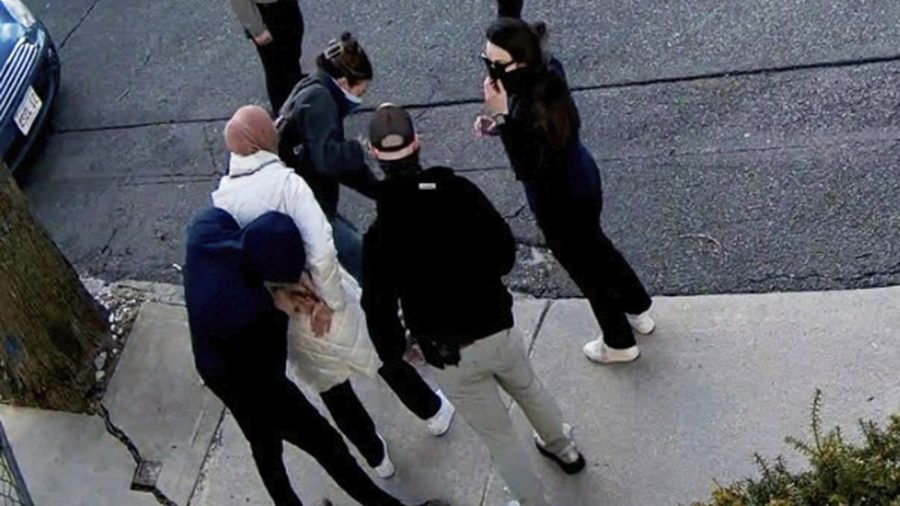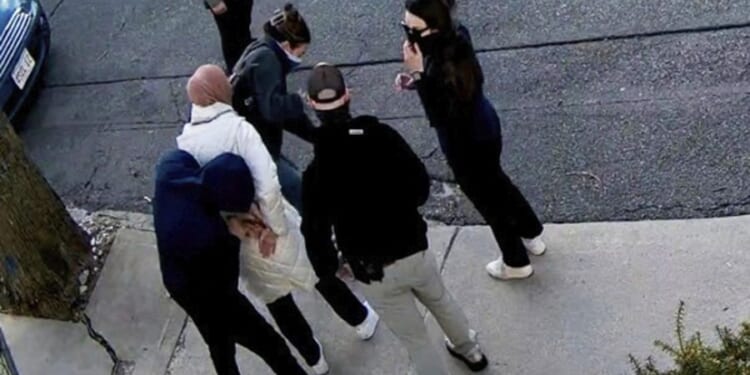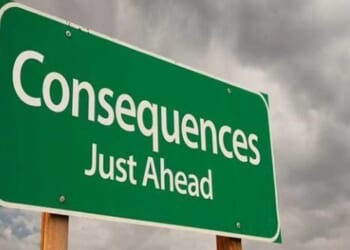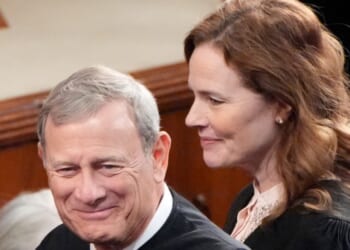
On March 25, masked plainclothes federal agents surrounded, seized and handcuffed a Turkish doctoral student named Rumeysa Ozturk near her home outside Boston.
Ozturk, who is enrolled at Tufts University on a valid student visa, was bundled into an unmarked car and shipped to an immigration detention center in Louisiana.
Authorities claim, without offering evidence, that Ozturk “engaged in activities in support of Hamas.” But her principle offense appears to be co-authoring an opinion essay criticizing Tufts’s response to the war in Gaza.
The video footage of the arrest was shocking but, these days, not surprising. During the 2024 presidential campaign, President Trump repeatedly threatened to crack down on campus protesters. Last May, he told campaign donors that “any student that protests, I throw them out of the country. You know, there are a lot of foreign students. As soon as they hear that, they’re going to behave.”
Shortly after taking office, Trump announced, “To all the resident aliens who joined in the pro-jihadist protests … we will find you, and we will deport you. I will also quickly cancel the student visas of all Hamas sympathizers on college campuses, which have been infested with radicalism like never before.”
Last month, Mahmoud Khalil, a Columbia University student with a green card and a pregnant American wife, was the first detained and threatened with deportation. He was accused, apparently without evidence, of ties to Hamas.
Other students and researchers at Columbia, Cornell, Harvard, Georgetown, the University of Alabama and elsewhere have subsequently been targeted for deportation because they posed unspecified “national security concerns.”
Secretary of State Marco Rubio estimates he has revoked more than 300 visas of students and other international visitors whose activities “are counter … to our foreign policy.” “Every time I find one of these lunatics,” he told reporters, “I take away their visas.”
Rubio may be using the State Department’s recently launched “catch and revoke” program, which enlists artificial intelligence to scour social media to identify “foreign nationals who appear to support Hamas or other designated terror groups.” Similar efforts are being made to deny visas to students who have criticized the U.S. or Israel, in keeping with an executive order urging deportation of foreign nationals who have adopted “hostile attitudes” toward American “citizens, culture, government, institutions or founding principles.”
In a departure from past practice, students deprived of their visas are being forced to leave the country immediately. And increasingly, foreign visitors and researchers at U.S. ports of entry are being denied admission or subjected to intrusive searches of their cell phones and laptops.
Multiple lawsuits have already been filed challenging the legality of these detentions and deportations, raising issues at the intersection of free speech, due process and immigration law. But there is a more fundamental question that the focus on contested legal issues risks obscuring: Is the Trump administration’s treatment of foreign students and researchers consistent with American values, norms and interests?
Jonathan Greenblatt, head of the Anti-Defamation League, offers an obvious answer in a recent essay decrying the Trump administration’s deportation of campus activists: “If we sacrifice our constitutional freedoms in the pursuit of security, we undermine the very foundation of the diverse, pluralistic society we seek to defend.”
The Constitution clearly acknowledges the free speech and due process rights of noncitizens within the U.S., but the application of those rights in the immigration context is often unclear, given the government’s broad discretion over visas, detentions and deportations. The administration is relying in large part on a vague and seldom used provision in the Immigration and Nationality Act of 1952, which permits the secretary of State to deport noncitizens if there is a “reasonable ground to believe” their presence “would have potentially serious adverse foreign policy consequences.”
The Trump administration is clearly targeting students and researchers for their political beliefs in defiance of the First Amendment. He is doing so in numbers not seen since the McCarthy Era, when the government sought to deport thousands of noncitizens alleged to be Communist sympathizers.
The result is a climate of fear and anxiety. Unable to wait for courts to sort through the legal thicket, many noncitizen students, faculty and staff are avoiding international travel and any protest activity, social media posts, public writings or scholarship that might make them a target for deportation. Some fear to attend classes or campus events. The dean of Columbia’s Graduate School of Journalism warned his institution’s international students that “nobody can protect you.”
It is hard to overstate the damage now being done to American higher education. The freedom to pursue ideas wherever they lead has made U.S. colleges and universities the envy of the world. Chilling the expression of a substantial segment of the community weakens the entire community.
Prospective international students are already questioning the wisdom — and safety — of studying in the U.S., potentially depriving American higher education some of the world’s most talented young people, who often become productive American citizens or return home and apply the lessons of democracy in their countries. America also risks losing faculty and graduate students critical to the advanced research that helps power the U.S. economy.
Is this the America we aspire to be? A country where masked agents clothed in black can seize foreign students on the street; give them little or no opportunity to know, let alone refute, the basis for their detention; and then deport them? Where a man, whose wife and autistic five-year-old son are U.S. citizens residing in Maryland, can be deported to El Salvador due to an “administrative error,” which Justice Department officials say they cannot rectify because he is now in custody in a foreign country?
As the courts address the legal questions, Americans across the political spectrum should speak out. Conservatives, who have long opposed excessive government intrusion into the lives of individuals, should be especially incensed, and their demands that this profoundly un-American activity cease might carry far more political weight.
The administration’s “flood the zone” strategy makes it hard to focus on any one threat, whether to higher education or democratic institutions generally. But if we do not speak up when others are being taken away, we risk, to paraphrase German theologian Martin Niemoller’s famous poem, a world in which there is “no one left to speak out for us.”
Glenn C. Altschuler is the Thomas and Dorothy Litwin Emeritus Professor of American Studies at Cornell University. David Wippman is emeritus president of Hamilton College.











